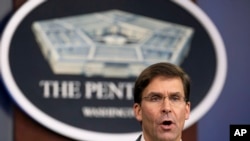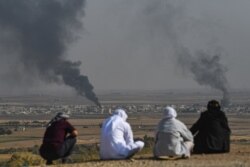The U.S. Defense Department on Friday criticized Turkey's military offensive into northeastern Syria as damaging to U.S.-Turkey relations and the fight against Islamic State, vowing to remain committed to Kurdish fighters who helped in the territorial defeat of the terror group.
"We are not abandoning our Kurdish partner forces," U.S. Defense Secretary Mark Esper told reporters at the Pentagon as Turkish forces continued an attack on a 30-kilometer zone in Syria's northeast. The area is controlled by the U.S.-allied Syrian Democratic Forces (SDF), which include the Kurdish YPG military force at the center of Turkey's crosshairs.
Esper said no one "greenlighted" the Turkish operation in northeast Syria. Instead, he said it was "just the opposite," with officials pushing back "very hard at all levels" of government.
"The impulsive action of [Turkish] President [Recep Tayyip] Erdogan to invade northern Syria has put the United States in a tough situation," Esper added. "This operation puts our SDF partners in harm's way, it risks the security of ISIS prison camps, and will further destabilize the region."
The chairman of the Joint Chiefs of Staff, Army General Mark Milley, told reporters the U.S. remains "co-located" with its SDF partners, with the exception of "two small outposts" in the area from Tal Abyad and Ras al-Ayn.
"We are still conducting operations" against Islamic State, Milley said. "Obviously this incursion that was initiated by the Turks has had some effect."
Ahead of the offensive, the U.S. moved about 50 American troops out of the 30-kilometer zone to keep them away from potential Turkish strikes.
Prior to that, the U.S. had convinced SDF forces in the area to dismantle some of their defenses to show Turkey the groups were not a threat to Ankara.
The U.S. also had been conducting joint air and ground patrols in northeastern Syria with Turkish forces to address what Esper called "Turkey's legitimate security concerns with regard to the PKK," or the Kurdistan Workers Party, which both the U.S. and Turkey consider a terror group.
Esper and Milley said that Turkey decided to carry out this offensive despite these U.S. efforts, and they've seen "no indication" that Turkey is willing to stop.
"We thought we were making good progress on the security zone ... We were doing all the things we agreed to do. I can't explain why they did what they did," Esper said.












